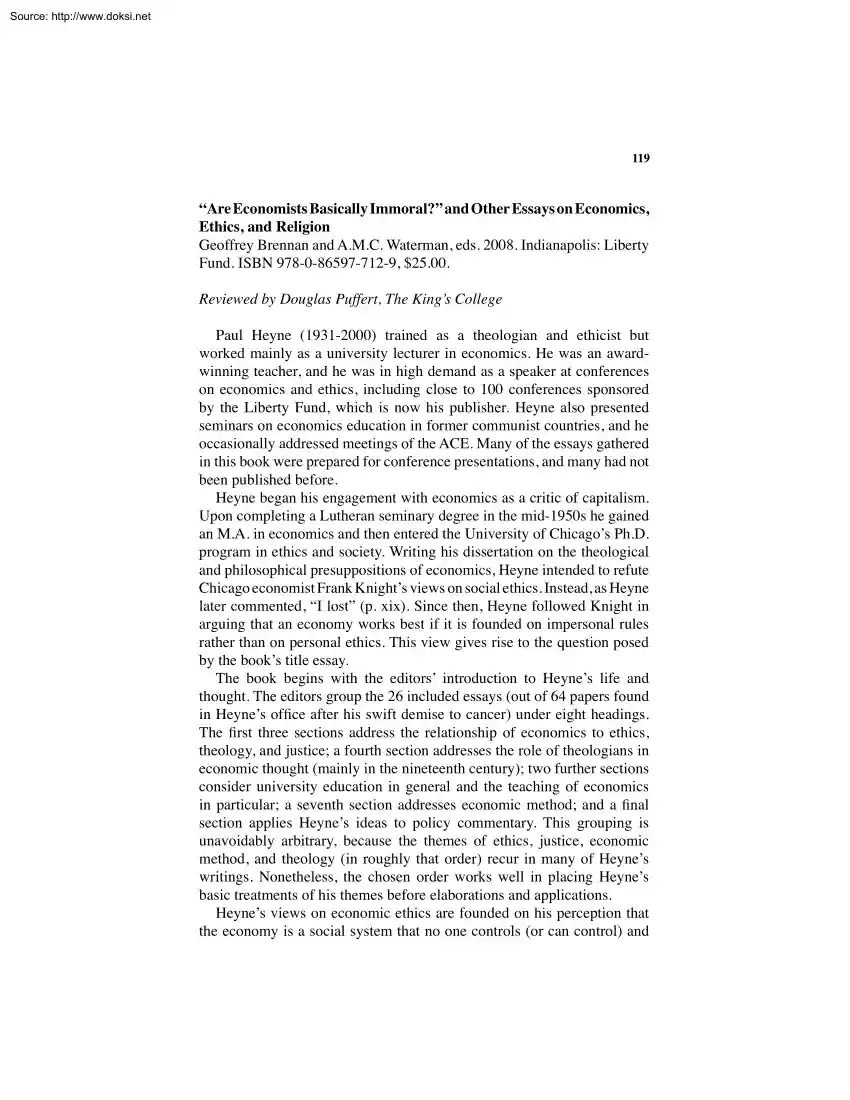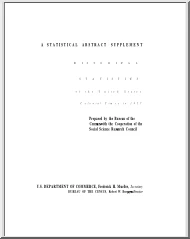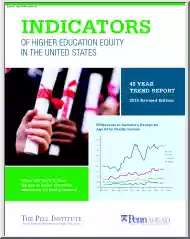Értékelések
Nincs még értékelés. Legyél Te az első!
Mit olvastak a többiek, ha ezzel végeztek?
Tartalmi kivonat
Source: http://www.doksinet 119 “Are Economists Basically Immoral?” and Other Essays on Economics, Ethics, and Religion Geoffrey Brennan and A.MC Waterman, eds 2008 Indianapolis: Liberty Fund. ISBN 978-0-86597-712-9, $2500 Reviewed by Douglas Puffert, The King’s College Paul Heyne (1931-2000) trained as a theologian and ethicist but worked mainly as a university lecturer in economics. He was an awardwinning teacher, and he was in high demand as a speaker at conferences on economics and ethics, including close to 100 conferences sponsored by the Liberty Fund, which is now his publisher. Heyne also presented seminars on economics education in former communist countries, and he occasionally addressed meetings of the ACE. Many of the essays gathered in this book were prepared for conference presentations, and many had not been published before. Heyne began his engagement with economics as a critic of capitalism. Upon completing a Lutheran seminary degree in the mid-1950s he gained
an M.A in economics and then entered the University of Chicago’s PhD program in ethics and society. Writing his dissertation on the theological and philosophical presuppositions of economics, Heyne intended to refute Chicago economist Frank Knight’s views on social ethics. Instead, as Heyne later commented, “I lost” (p. xix) Since then, Heyne followed Knight in arguing that an economy works best if it is founded on impersonal rules rather than on personal ethics. This view gives rise to the question posed by the book’s title essay. The book begins with the editors’ introduction to Heyne’s life and thought. The editors group the 26 included essays (out of 64 papers found in Heyne’s office after his swift demise to cancer) under eight headings. The first three sections address the relationship of economics to ethics, theology, and justice; a fourth section addresses the role of theologians in economic thought (mainly in the nineteenth century); two further sections
consider university education in general and the teaching of economics in particular; a seventh section addresses economic method; and a final section applies Heyne’s ideas to policy commentary. This grouping is unavoidably arbitrary, because the themes of ethics, justice, economic method, and theology (in roughly that order) recur in many of Heyne’s writings. Nonetheless, the chosen order works well in placing Heyne’s basic treatments of his themes before elaborations and applications. Heyne’s views on economic ethics are founded on his perception that the economy is a social system that no one controls (or can control) and Source: http://www.doksinet 120 FAITH & ECONOMICS that produces results that no one intends. Markets coordinate people’s actions, enabling them to cooperate in pursuing their individual projects without knowing what others’ projects are. Participants in the process promote the public interest most effectively by pursuing their individual
interests. In Heyne’s observation, “most people seem to believe that is just not the way to promote the public interest. Morality has to do with intentions more than results; so the person who tried to run you down with his car but missed is morally more culpable than the person who actually ran you down but while trying to get to church” (p. 5) Likewise, ethically minded people would frequently prefer an economic system based on proper intentionsdistribution “to each according to need,” payment of a “living wage,” and so fortheven though the practical result of applying personal morality is to disrupt the impersonal rules that best facilitate social cooperation. Such ethicists, Heyne observes, fail to distinguish between “the face-to-face society, like the family, in which we can and should directly pursue one another’s welfare” and the “large, necessarily impersonal societies in which we cooperate to our mutual advantage with thousands, even millions, of people
whom we usually do not even see, but whose welfare we promote most effectively by diligently pursuing our own welfare” (p. 6) Only a family, or a family-like institution such as a small religious community, can apply the principle of “from each according to one’s ability, to each according to one’s need.” In larger societies, people not only cannot care enough, but they also “simply cannot know enough to assign tasks and benefits on the basis of personal circumstances and still do it fairly” (p. 43) Thus social or economic justice, in Heyne’s view, can only be based on impersonal rules in a large society. Equality does not work as a substantive criterion of justice, because any equalizing redistribution would immediately be overthrown by the different choices of different individuals. Need also does not work as a criterion, because there is no absolute standard of need. Judgments about need prove to be historically relative and ultimately based on a desire for greater
equality. Merit, Heyne observes, is a criterion frequently discounted in discussions of substantive justice. Heyne observes that people cannot agree on the substantive criteria of justice, but they often can agree that particular actions are unjust. In particular, people agree that the violation of legitimate expectations is unjust. Heyne argues, therefore, that justice in any large, impersonal society (as opposed to a face-to-face community) can only be defined Source: http://www.doksinet 121 in terms of procedures, not substantive outcomes. In particular, justice requires the satisfaction of legitimate expectations or, more simply, the keeping of promises. At the level of a large society, these promises are defined by laws as well as commonly accepted social norms and moral standards. Heyne acknowledges a role for an open-ended “morality of aspiration” that goes beyond a “morality of duty” (p. 460) but he insists that government refrain from arbitrary action: I am .
insisting that to whatever extent government controls the use of resources and the distribution of income, it ought to do so by promulgating and enforcing clear and stable rules. That leaves a great deal of room for government assistance to less fortunate members of society. What it excludes are vague and uncertain rules, which permit and encourage bureaucratic self-seeking, tyranny, and other political injustices, while making it more difficult for members of society to plan effectively. In the interest of both justice and efficiency, government must establish clear and stable laws” (p. 44). In several essays Heyne addresses self-interest and rationality, the characteristics of homo economicus. In one essay in particular, Can Homo Economicus be Christian? (pp. 49-80), Heyne offers a very useful survey of how economists have used and misused these concepts from Adam Smith to the present day. Along the way, Heyne offers helpful distinctions related to selfishness and greed, the
legitimate desire to improve one’s condition, and purposive behavior. Heyne’s discussion of these matters goes further than most, if not all, recent treatments, and he points to important but neglected sources of further discussion. Other essays apply Heyne’s basic views on social ethics to efforts to apply Christian principles to the economy. Heyne’s basic conclusion, familiar to those who have heard him speak at ACE meetings, is that no specifically Christian principles offer any insight on the functioning or moral analysis of a market economy. Heyne buttresses this view with critiques of his allies, such as evangelical social critic Herbert Schlossberg (pp. 118-29), as well as of church social statements with which he disagrees strongly. He provides a masterful evaluation of the incoherence of the US Catholic bishops’ 1982 draft for a pastoral letter on the economy (pp. 15191) Heyne’s critique applies not only his understanding of economics, but also his knowledge of
biblical studies. Citing John Howard Yoder’s Source: http://www.doksinet 122 FAITH & ECONOMICS The Politics of Jesus, Heyne argues that the Kingdom of God is supposed to find a partial realization in the present age, as the bishops suggest, but that Christians should not pursue this through the inherently coercive instrument of the state. More broadly, Heyne regards any “foundationalism”any attempt to ground economic science or other body of knowledge on clear and unambiguous axioms and hypothesesas both misguided and unnecessary. He remarks in several essays on the connection between the words foundationalism and fundamentalism as used in religious contexts. Likewise, as Heyne explains repeatedly, he rejects a distinction between “positive” economics, based on reasoned empirical analysis, and “normative” economics, which incorporates value judgments that are presumably not subject to reasoning. Following Michael Polanyi (Personal Knowledge) and others, Heyne
views all knowledge as “personal knowledge,” requiring commitment by a knower and acceptance by a community. He also argues that people can indeed reason about values, that economics offers much insight to assist such reasoning, and that economists should acknowledge that they already do so despite their disclaimers. Heyne’s early writings on these matters, dating back to the 1970s, anticipated the work of D.N McCloskey, and his later writings referred to McCloskey’s work. (Longtime readers of this journal and the prior ACE Bulletin will recall Heyne’s favorable reviews and recommendations of McCloskey’s books.) Heyne is best known for his introductory textbook The Economic Way of Thinking (now carried on by P. Boettke and DL Prychitko) which illustrates his interest and strong facility in teaching economics. In several essays on economic education and method, Heyne argues that economics is most useful for analyzing processes of exchange, not optimization and questions of
efficiency. The former is grounded in human behavior and highly useful for understanding all social phenomena; the latter is rigorous but abstract “blackboard economics” that, in Heyne’s view, has weak foundations. Heyne argues for teaching through plausible stories rather than rigorous models, and he urges economists to recover “the art of economics.” Heyne laments that economists frequently find verbal theorizing and illustrative stories unrespectable without validation by rigorous mathematical models. In Heyne’s view, models may sometimes be useful for discouraging ad hoc theorizing and for demonstrating how arguments conform “to the organizing premise of economic theory: that social phenomena are the consequence of self-interested interactions pushing toward equilibrium positions” (p. 367) He also cites with approval Source: http://www.doksinet 123 a comment that mathematical modeling is useless if it does not clarify concepts or demonstrate implications that
are not otherwise apparent, so perhaps he allows those purposes as well (pp. 366-67) Heyne was himself unskilled in advanced mathematics, but he did not regard that as a drawback to his work (p. xvii) The later essays in this book apply Heyne’s views on economics and ethics to the relationship between law and economics, to drug legalization, to the social responsibilities of business, to labor unions, and to environmentalism. All are rich in insights I will refrain from an extensive critique of Heyne’s views, as I find myself at least as stimulated by arguments that I do not (yet?) find convincing as by those that I do. As Heyne’s undergraduate student and then his friend over the years, I profited greatly from his ideas, and I rejoice that they are now more available to me as well as to others. There is no recent scholar whose work is of greater interest for the aims of the Association of Christian Economists and the readers of this journal. I suggest that you pay the small
incremental price for the hardcover edition, as otherwise you may wear out the book long before you have exhausted its riches. References Heyne, P., Boettke, PJ, & Prychitko, DL (2009) The economic way of thinking (12th ed.) New York: Prentice Hall Polanyi, M. (1958) Personal knowledge: Toward a post-critical philosophy. Chicago: University of Chicago Press Yoder, J.H (1972) The politics of Jesus Grand Rapids: Eerdmans
an M.A in economics and then entered the University of Chicago’s PhD program in ethics and society. Writing his dissertation on the theological and philosophical presuppositions of economics, Heyne intended to refute Chicago economist Frank Knight’s views on social ethics. Instead, as Heyne later commented, “I lost” (p. xix) Since then, Heyne followed Knight in arguing that an economy works best if it is founded on impersonal rules rather than on personal ethics. This view gives rise to the question posed by the book’s title essay. The book begins with the editors’ introduction to Heyne’s life and thought. The editors group the 26 included essays (out of 64 papers found in Heyne’s office after his swift demise to cancer) under eight headings. The first three sections address the relationship of economics to ethics, theology, and justice; a fourth section addresses the role of theologians in economic thought (mainly in the nineteenth century); two further sections
consider university education in general and the teaching of economics in particular; a seventh section addresses economic method; and a final section applies Heyne’s ideas to policy commentary. This grouping is unavoidably arbitrary, because the themes of ethics, justice, economic method, and theology (in roughly that order) recur in many of Heyne’s writings. Nonetheless, the chosen order works well in placing Heyne’s basic treatments of his themes before elaborations and applications. Heyne’s views on economic ethics are founded on his perception that the economy is a social system that no one controls (or can control) and Source: http://www.doksinet 120 FAITH & ECONOMICS that produces results that no one intends. Markets coordinate people’s actions, enabling them to cooperate in pursuing their individual projects without knowing what others’ projects are. Participants in the process promote the public interest most effectively by pursuing their individual
interests. In Heyne’s observation, “most people seem to believe that is just not the way to promote the public interest. Morality has to do with intentions more than results; so the person who tried to run you down with his car but missed is morally more culpable than the person who actually ran you down but while trying to get to church” (p. 5) Likewise, ethically minded people would frequently prefer an economic system based on proper intentionsdistribution “to each according to need,” payment of a “living wage,” and so fortheven though the practical result of applying personal morality is to disrupt the impersonal rules that best facilitate social cooperation. Such ethicists, Heyne observes, fail to distinguish between “the face-to-face society, like the family, in which we can and should directly pursue one another’s welfare” and the “large, necessarily impersonal societies in which we cooperate to our mutual advantage with thousands, even millions, of people
whom we usually do not even see, but whose welfare we promote most effectively by diligently pursuing our own welfare” (p. 6) Only a family, or a family-like institution such as a small religious community, can apply the principle of “from each according to one’s ability, to each according to one’s need.” In larger societies, people not only cannot care enough, but they also “simply cannot know enough to assign tasks and benefits on the basis of personal circumstances and still do it fairly” (p. 43) Thus social or economic justice, in Heyne’s view, can only be based on impersonal rules in a large society. Equality does not work as a substantive criterion of justice, because any equalizing redistribution would immediately be overthrown by the different choices of different individuals. Need also does not work as a criterion, because there is no absolute standard of need. Judgments about need prove to be historically relative and ultimately based on a desire for greater
equality. Merit, Heyne observes, is a criterion frequently discounted in discussions of substantive justice. Heyne observes that people cannot agree on the substantive criteria of justice, but they often can agree that particular actions are unjust. In particular, people agree that the violation of legitimate expectations is unjust. Heyne argues, therefore, that justice in any large, impersonal society (as opposed to a face-to-face community) can only be defined Source: http://www.doksinet 121 in terms of procedures, not substantive outcomes. In particular, justice requires the satisfaction of legitimate expectations or, more simply, the keeping of promises. At the level of a large society, these promises are defined by laws as well as commonly accepted social norms and moral standards. Heyne acknowledges a role for an open-ended “morality of aspiration” that goes beyond a “morality of duty” (p. 460) but he insists that government refrain from arbitrary action: I am .
insisting that to whatever extent government controls the use of resources and the distribution of income, it ought to do so by promulgating and enforcing clear and stable rules. That leaves a great deal of room for government assistance to less fortunate members of society. What it excludes are vague and uncertain rules, which permit and encourage bureaucratic self-seeking, tyranny, and other political injustices, while making it more difficult for members of society to plan effectively. In the interest of both justice and efficiency, government must establish clear and stable laws” (p. 44). In several essays Heyne addresses self-interest and rationality, the characteristics of homo economicus. In one essay in particular, Can Homo Economicus be Christian? (pp. 49-80), Heyne offers a very useful survey of how economists have used and misused these concepts from Adam Smith to the present day. Along the way, Heyne offers helpful distinctions related to selfishness and greed, the
legitimate desire to improve one’s condition, and purposive behavior. Heyne’s discussion of these matters goes further than most, if not all, recent treatments, and he points to important but neglected sources of further discussion. Other essays apply Heyne’s basic views on social ethics to efforts to apply Christian principles to the economy. Heyne’s basic conclusion, familiar to those who have heard him speak at ACE meetings, is that no specifically Christian principles offer any insight on the functioning or moral analysis of a market economy. Heyne buttresses this view with critiques of his allies, such as evangelical social critic Herbert Schlossberg (pp. 118-29), as well as of church social statements with which he disagrees strongly. He provides a masterful evaluation of the incoherence of the US Catholic bishops’ 1982 draft for a pastoral letter on the economy (pp. 15191) Heyne’s critique applies not only his understanding of economics, but also his knowledge of
biblical studies. Citing John Howard Yoder’s Source: http://www.doksinet 122 FAITH & ECONOMICS The Politics of Jesus, Heyne argues that the Kingdom of God is supposed to find a partial realization in the present age, as the bishops suggest, but that Christians should not pursue this through the inherently coercive instrument of the state. More broadly, Heyne regards any “foundationalism”any attempt to ground economic science or other body of knowledge on clear and unambiguous axioms and hypothesesas both misguided and unnecessary. He remarks in several essays on the connection between the words foundationalism and fundamentalism as used in religious contexts. Likewise, as Heyne explains repeatedly, he rejects a distinction between “positive” economics, based on reasoned empirical analysis, and “normative” economics, which incorporates value judgments that are presumably not subject to reasoning. Following Michael Polanyi (Personal Knowledge) and others, Heyne
views all knowledge as “personal knowledge,” requiring commitment by a knower and acceptance by a community. He also argues that people can indeed reason about values, that economics offers much insight to assist such reasoning, and that economists should acknowledge that they already do so despite their disclaimers. Heyne’s early writings on these matters, dating back to the 1970s, anticipated the work of D.N McCloskey, and his later writings referred to McCloskey’s work. (Longtime readers of this journal and the prior ACE Bulletin will recall Heyne’s favorable reviews and recommendations of McCloskey’s books.) Heyne is best known for his introductory textbook The Economic Way of Thinking (now carried on by P. Boettke and DL Prychitko) which illustrates his interest and strong facility in teaching economics. In several essays on economic education and method, Heyne argues that economics is most useful for analyzing processes of exchange, not optimization and questions of
efficiency. The former is grounded in human behavior and highly useful for understanding all social phenomena; the latter is rigorous but abstract “blackboard economics” that, in Heyne’s view, has weak foundations. Heyne argues for teaching through plausible stories rather than rigorous models, and he urges economists to recover “the art of economics.” Heyne laments that economists frequently find verbal theorizing and illustrative stories unrespectable without validation by rigorous mathematical models. In Heyne’s view, models may sometimes be useful for discouraging ad hoc theorizing and for demonstrating how arguments conform “to the organizing premise of economic theory: that social phenomena are the consequence of self-interested interactions pushing toward equilibrium positions” (p. 367) He also cites with approval Source: http://www.doksinet 123 a comment that mathematical modeling is useless if it does not clarify concepts or demonstrate implications that
are not otherwise apparent, so perhaps he allows those purposes as well (pp. 366-67) Heyne was himself unskilled in advanced mathematics, but he did not regard that as a drawback to his work (p. xvii) The later essays in this book apply Heyne’s views on economics and ethics to the relationship between law and economics, to drug legalization, to the social responsibilities of business, to labor unions, and to environmentalism. All are rich in insights I will refrain from an extensive critique of Heyne’s views, as I find myself at least as stimulated by arguments that I do not (yet?) find convincing as by those that I do. As Heyne’s undergraduate student and then his friend over the years, I profited greatly from his ideas, and I rejoice that they are now more available to me as well as to others. There is no recent scholar whose work is of greater interest for the aims of the Association of Christian Economists and the readers of this journal. I suggest that you pay the small
incremental price for the hardcover edition, as otherwise you may wear out the book long before you have exhausted its riches. References Heyne, P., Boettke, PJ, & Prychitko, DL (2009) The economic way of thinking (12th ed.) New York: Prentice Hall Polanyi, M. (1958) Personal knowledge: Toward a post-critical philosophy. Chicago: University of Chicago Press Yoder, J.H (1972) The politics of Jesus Grand Rapids: Eerdmans





